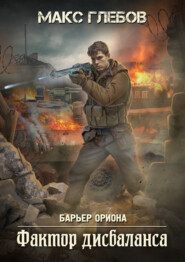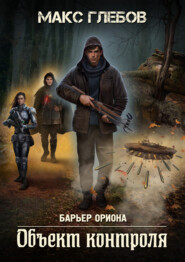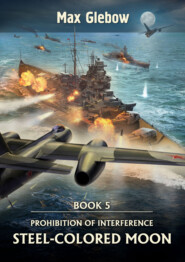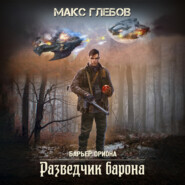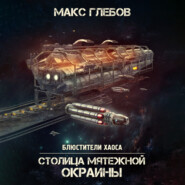По всем вопросам обращайтесь на: info@litportal.ru
(©) 2003-2024.
✖
Prohibition of Interference. Book 3. Impact Strategy
Настройки чтения
Размер шрифта
Высота строк
Поля
Prohibition of Interference. Book 3. Impact Strategy
Max Glebow
Prohibition of Interference #3
Pyotr Nagulin finally sorted out his relationship with the NKVD and, it seems to him, convinced the Soviet leadership of his loyalty. However, his new position brought him new problems. He is now in Moscow, still far from the front, but Senior Lieutenant of State Security cannot calmly watch as hundreds of thousands of encircled Red Army soldiers die in the Kiev pocket. He goes to his superiors with a proposal that once again casts doubt on his fate.
Max Glebow
Prohibition of Interference. Book 3. Impact Strategy
Chapter 1
The counterstrokes of the 40th and 21st Armies had no chance of success. These armies, severely weakened in previous battles for Kiev, even after replenishment were not powerful enough to break the encirclement ring and reopen the corridor to the remnants of the three armies trapped in the pocket. However, this was the case where it was impossible to win, but the troops had to go into battle anyway, as no one in the Headquarters of the Supreme High Command even wanted to think about leaving 200,000 men to die in the pocket.
The computer nonchalantly showed me the dry numbers of the balance of forces. It had no special programs to predict the outcome of battles. These programs remained at the moonbase, where scientists would have easily calculated for me the probability of success for each side, the optimal strategy and tactics for both adversaries and the mathematical expectation of loss. Nevertheless, some estimates could be made with the means at my disposal.
I didn't have a lot of time to figure out satellite management, but I tried to make time for it. It was very difficult. If there was something I didn't understand in the manuals, and this happened quite often, I had no one to ask for help. My basic education was not at all designed for the tasks I had set for myself. The satellites management interface implied that the operator had a certain level of knowledge, and the manuals were also designed for people with this knowledge. As a result, I just didn't understand some of the terms. The rescue capsule computer managed to help me on occasion by providing reference information, but its databases were also not compiled for controlling scientific satellites, and certainly not for helping a pilot create programs to analyze the combat capabilities of pre-space-era armies.
I was taught the basics of programming. It was thought that the pilot as a user of numerous space combat simulators should have an idea of how they worked. No one, of course, did expect that I would change any parameters of the source code to suit my purposes, or that I would look for undocumented features of the programs, but the developers of the course thought that I should understand the principles of computer decision-making, at least in general terms.
This subject seemed to me at first completely useless, but I suddenly became interested in it for a while, seeing it as a good exercise for my brain, and the head of the study department was greatly surprised. Then I gave it up for current affairs, but I still had some skills, and now I was genuinely happy about that old hobby.
My immediate superior was Senior Major of State Security Sudoplatov, a figure who enjoyed enormous prestige and almost unlimited confidence in the Commissariat, headed by Beria, which he had earned through his dangerous but murderously effective operations to eliminate the head of the Ukrainian nationalists Evgeny Konovalets and Lev Trotsky, Stalin's personal enemy. Frankly, I was wary of Sudoplatov, and I did not want to tell him the results of my reflections, which made me very skeptical about the idea of unblocking the troops encircled near Kiev by the attack of the 40th and 21st Armies. I didn't want to hear him accuse me of defeatism.
However, I couldn't just go about my day-to-day business, watching counterattack attempts fail one by one. In general, I realized one simple thing – this war was gradually ceasing to be a foreign war for me. I used to consider as my own only the Red Army soldiers and commanders directly surrounding me, those people with whom I went into battle together, but as time went on I began to realize that this concept was rapidly embracing more and more people. At some point, the air defense platoon became my own, then the entire composite battalion of General Muzychenko, then the 300th Division, the artillery regiment of Lieutenant Colonel Tsaitiuni, and nowadays the entire Southwestern Front, now torn by the Germans into two parts and divided into encircled and those outside the pocket, seem to have fallen into the same category.
It cost me a lot of trouble to get the artificial intelligence left in the escape pod and the satellites' onboard computers to work together. Before the destruction of the moonbase, they did not interact with each other in any way, and it was believed that they should not interact with each other. Theoretically, the access codes I had allowed me to pair these devices with each other, but in practice I spent hours on this task. But now the training of the artificial neural network I created to simulate the actions of the Russian and German armies, was much more efficient. And most importantly, this process did not require my direct participation. Direct access to the Satellite Network databases allowed the capsule computer to draw from them all the necessary information about the course of battles and maneuvers, the practice of using this or that weapon, the abilities and skills of commanders, in general, everything that needed to be fed to the neural network to train it on historical data.
Of course, I did not create the neural network from scratch. This amount of programming would have been too much for me, I simply could not cope with the task at my skill level. Luckily for me the Satellite Network user interface offered a large selection of ready-made blocks from which I could assemble the programs I needed, as from the parts of an erector set. Of course, this still required a basic knowledge of the process, and, as it turned out, my level of training was barely sufficient, as I was faced with a very nontrivial task.
It took me three days to train the neural network. I checked the result and verified that my program gives predictions that are quite acceptable in accuracy when tested on battles that have already been fought. I could only hope that the program would also be able to predict the course of upcoming battles.
As I had feared, Sudoplatov saw in my abilities, above all, an excellent opportunity to form a super-efficient raiding force. He may even have been able to convince Beria that this was the way to use us. In any case, all the first few days we were trained in the sabotage training program.
Naturally, this did not suit me. I wasn't going to spend the whole war running around German back areas, blowing up bridges and capturing prisoners for interrogation. In principle, I had nothing against this use of my squad, but only as one of the directions, an auxiliary direction and no more than that. However, there was no suitable moment for me to have a serious conversation with the new commander, and I had no good arguments. Now, after the failure of several attempts to release the encircled troops, arguments have emerged.
“Comrade Senior Major of State Security, allow me to address you,” I stopped my immediate supervisor after another briefing.
“I'm listening to you.” Sudoplatov was in a bad mood. Apparently, the state of affairs at the front was not conducive to optimism.
“As far as I can tell, attempts to break through a corridor to the troops surrounded near Kiev have so far yielded no positive results,” I said softly, so that no one could hear my words but us. “I believe the 40th and 21st Armies were forced to fall back to their original positions, or even retreat further east…”
“How do you know this, Senior Lieutenant? The current situation at the front was not brought to your attention,” Sudoplatov looked at me sharply.
“A few days ago Comrade Beria showed me a map of the Kiev pocket area with the situation at that time. I thought a lot about this subject and came to the conclusion that the forces we have are totally insufficient to break through the encirclement.”
“Even if so, what does that have to do with our current tasks, Senior Lieutenant? Why are you telling me all this?”
“This has the most direct relevance to our current tasks, Comrade Senior Major of State Security. If you give me ten minutes, I'll explain everything, but I'd rather not do it here.”
“All right, let's go. No one will disturb us in my office,” answered Sudoplatov and walked quickly down the corridor.
As we walked, I once again laid out the details of the plan that had been born in my head this morning, which had been finalized by the computer just in time for the end of class.
“I understand that you have some specific ideas,” said Sudoplatov, taking a seat in the chair behind his desk and gesturing for me to take one of the visitors' seats. “I don't have a lot of time, so get right to the point.”
“There are two major problems that prevent the 40th and 21st Armies from achieving success. It is the enemy's advantage in mobility and communications. The Germans closed the ring with motorized formations. In addition, they have quite enough infantry from Weichs's army and from the infantry divisions accumulated at the Kremenchuk bridgehead. As a result, the enemy can quite easily nullify any of the planned successes of our troops by quickly moving tanks and artillery to the threatened area. ”
“This is not news,” Sudoplatov shrugged. “This has been the state of affairs since the beginning of the war.”
“You are certainly right. In this case, however, the concentration of the enemy's mobile units is several times higher than it usually is. In fact, our armies are facing two tank groups, albeit somewhat tattered in previous battles and stretched over a fairly wide front. If we just try to find a weakness in their defense and try to make a breach there, it won't work, we'll only lose men and equipment.”
“Let's say,” the Senior Major did not argue, “but I haven't heard any concrete suggestions yet.”
“The only way to ensure the success of the breakthrough is to disorganize the enemy's troop control. It is necessary to strike the headquarters of the German motorized corps immediately before attacking from outside and inside the ring.”
“It's a great plan,” Sudoplatov grinned venomously, “And how do you want to do that, Senior Lieutenant? Perhaps you know the locations of these headquarters? Or do you think the Germans will let our air reconnaissance sniff out every square meter of their territory? Have you forgotten who has supremacy in the air now?”
“Comrade Beria told me that he had some very interesting photographs,” I answered calmly, without reacting in any way to the sneer in the voice of my immediate superior. “It shows what was left of the German convoy after a nighttime bombardment by one of the TB-3s whose pilots were receiving my commands from the ground. I was ten kilometers away, but the bombs hit the target.”
I was silent, but the famous saboteur took his time answering and just looked at me carefully, waiting for me to continue.
“I need a fast reconnaissance plane with an experienced pilot and three fighters to cover me. And then, when it gets dark, I need a dozen long-range TB-7 and Yer-2 bombers from among the planes that flew to bomb Berlin in August.”
“Don't you need a couple of armies to reinforce you, Senior Lieutenant?” Sudoplatov leaned back in his chair, looking at me as if I were some exotic curiosity, “We, if you have noticed, are dealing here with somewhat different issues, which are quite far from empty projects. I have only a month to make real saboteurs out of you, able to pass German barriers like a knife through butter, and I'll do it! And you, Comrade Nagulin, are suggesting that I should disobey orders, interrupt the group's preparations, and get on with your adventure, because of which I will have to distract very serious people from important matters.”
“200,000 of our fighters and commanders are waiting for help in the Kiev pocket,” I said slowly, emphasizing each word in my voice, “And they will stay there forever. They will be cut to pieces and killed individually, unless, of course, we change anything in the current breakthrough plans. You are an experienced commander, Comrade Senior Major of State Security, and you know very well that I am right. I only need 24 hours, one day and one night. You are my immediate superior, and I have no one else to turn to. Please remember the bridge over the Dnieper and the events that followed. I was not immediately believed then, either.”
Sudoplatov stood up and gave me a bad look. I stood up, too, but he gestured for me to sit back down.
“Wait here,” ordered the Senior Major, and left the office, closing the door tightly behind him.
* * *
“So, you missed him,” to Richtengden's surprise, the General said this phrase in a completely calm voice, “You failed to wrest Major Schliemann from the hands of Russian saboteurs, and now we are forced to assume that everything he knew, the enemy knows as well. This is all very unfortunate, don't you think, Colonel.”
“All responsibility for this failure lies solely with me, Herr General,” Richtengden answered clearly, looking his superior straight in the eye, “All my men and the "Brandenburg" fighters involved proved to be exceptionally competent specialists, and it was only my mistakes that caused the mission to fail.”
“Don't be in such a hurry to denounce yourself,” the General grinned with a corner of his lips. “Admiral Canaris instructed me to investigate the incident, and, believe me, I have carried out his orders with the utmost care. We have reconstructed the whole picture of what happened by questioning in detail all the participants in the events, from your men to the gendarmes and the infantry officers who carried out your orders. Those who survived, of course…”
The General was silent for a while, then thoughtfully poured some water from a decanter into his glass and took a couple of sips.
“No credible expert familiar with the case has found serious errors in your actions. This rarely happens, because some of them know you personally, and not always your relationship with these people is unclouded. However, their assessments agree – your actions in those circumstances were correct. Perhaps you were just unlucky. How is your arm, by the way? Does it bother you?”
“It's better, Herr General. Thank you, Sir.”
“Perhaps for the first time in this war we have encountered a factor beyond our understanding,” the General continued. “Your timely arrival in the vicinity of Kremenchuk put the counter-subversion operation back on track. You correctly assessed the actions of the enemy and led your men on the trail of the enemy group. Had it not been for this nighttime bombardment, which no one could have foreseen, the Russians would not have been able to land the transport plane on our territory and then get it in the air. Nevertheless, even under these circumstances you were able to inflict damage on the Russian transport plane. As a result, it crashed on an emergency landing, but unfortunately, it happened in the territory already occupied by the Soviet troops, and its passengers apparently survived.”
“It's a failure anyway, Herr General,” Richtengden shook his head, “and it's not the first one, if we remember on whose recommendation you involved Major Schliemann in the operation.”
Max Glebow
Prohibition of Interference #3
Pyotr Nagulin finally sorted out his relationship with the NKVD and, it seems to him, convinced the Soviet leadership of his loyalty. However, his new position brought him new problems. He is now in Moscow, still far from the front, but Senior Lieutenant of State Security cannot calmly watch as hundreds of thousands of encircled Red Army soldiers die in the Kiev pocket. He goes to his superiors with a proposal that once again casts doubt on his fate.
Max Glebow
Prohibition of Interference. Book 3. Impact Strategy
Chapter 1
The counterstrokes of the 40th and 21st Armies had no chance of success. These armies, severely weakened in previous battles for Kiev, even after replenishment were not powerful enough to break the encirclement ring and reopen the corridor to the remnants of the three armies trapped in the pocket. However, this was the case where it was impossible to win, but the troops had to go into battle anyway, as no one in the Headquarters of the Supreme High Command even wanted to think about leaving 200,000 men to die in the pocket.
The computer nonchalantly showed me the dry numbers of the balance of forces. It had no special programs to predict the outcome of battles. These programs remained at the moonbase, where scientists would have easily calculated for me the probability of success for each side, the optimal strategy and tactics for both adversaries and the mathematical expectation of loss. Nevertheless, some estimates could be made with the means at my disposal.
I didn't have a lot of time to figure out satellite management, but I tried to make time for it. It was very difficult. If there was something I didn't understand in the manuals, and this happened quite often, I had no one to ask for help. My basic education was not at all designed for the tasks I had set for myself. The satellites management interface implied that the operator had a certain level of knowledge, and the manuals were also designed for people with this knowledge. As a result, I just didn't understand some of the terms. The rescue capsule computer managed to help me on occasion by providing reference information, but its databases were also not compiled for controlling scientific satellites, and certainly not for helping a pilot create programs to analyze the combat capabilities of pre-space-era armies.
I was taught the basics of programming. It was thought that the pilot as a user of numerous space combat simulators should have an idea of how they worked. No one, of course, did expect that I would change any parameters of the source code to suit my purposes, or that I would look for undocumented features of the programs, but the developers of the course thought that I should understand the principles of computer decision-making, at least in general terms.
This subject seemed to me at first completely useless, but I suddenly became interested in it for a while, seeing it as a good exercise for my brain, and the head of the study department was greatly surprised. Then I gave it up for current affairs, but I still had some skills, and now I was genuinely happy about that old hobby.
My immediate superior was Senior Major of State Security Sudoplatov, a figure who enjoyed enormous prestige and almost unlimited confidence in the Commissariat, headed by Beria, which he had earned through his dangerous but murderously effective operations to eliminate the head of the Ukrainian nationalists Evgeny Konovalets and Lev Trotsky, Stalin's personal enemy. Frankly, I was wary of Sudoplatov, and I did not want to tell him the results of my reflections, which made me very skeptical about the idea of unblocking the troops encircled near Kiev by the attack of the 40th and 21st Armies. I didn't want to hear him accuse me of defeatism.
However, I couldn't just go about my day-to-day business, watching counterattack attempts fail one by one. In general, I realized one simple thing – this war was gradually ceasing to be a foreign war for me. I used to consider as my own only the Red Army soldiers and commanders directly surrounding me, those people with whom I went into battle together, but as time went on I began to realize that this concept was rapidly embracing more and more people. At some point, the air defense platoon became my own, then the entire composite battalion of General Muzychenko, then the 300th Division, the artillery regiment of Lieutenant Colonel Tsaitiuni, and nowadays the entire Southwestern Front, now torn by the Germans into two parts and divided into encircled and those outside the pocket, seem to have fallen into the same category.
It cost me a lot of trouble to get the artificial intelligence left in the escape pod and the satellites' onboard computers to work together. Before the destruction of the moonbase, they did not interact with each other in any way, and it was believed that they should not interact with each other. Theoretically, the access codes I had allowed me to pair these devices with each other, but in practice I spent hours on this task. But now the training of the artificial neural network I created to simulate the actions of the Russian and German armies, was much more efficient. And most importantly, this process did not require my direct participation. Direct access to the Satellite Network databases allowed the capsule computer to draw from them all the necessary information about the course of battles and maneuvers, the practice of using this or that weapon, the abilities and skills of commanders, in general, everything that needed to be fed to the neural network to train it on historical data.
Of course, I did not create the neural network from scratch. This amount of programming would have been too much for me, I simply could not cope with the task at my skill level. Luckily for me the Satellite Network user interface offered a large selection of ready-made blocks from which I could assemble the programs I needed, as from the parts of an erector set. Of course, this still required a basic knowledge of the process, and, as it turned out, my level of training was barely sufficient, as I was faced with a very nontrivial task.
It took me three days to train the neural network. I checked the result and verified that my program gives predictions that are quite acceptable in accuracy when tested on battles that have already been fought. I could only hope that the program would also be able to predict the course of upcoming battles.
As I had feared, Sudoplatov saw in my abilities, above all, an excellent opportunity to form a super-efficient raiding force. He may even have been able to convince Beria that this was the way to use us. In any case, all the first few days we were trained in the sabotage training program.
Naturally, this did not suit me. I wasn't going to spend the whole war running around German back areas, blowing up bridges and capturing prisoners for interrogation. In principle, I had nothing against this use of my squad, but only as one of the directions, an auxiliary direction and no more than that. However, there was no suitable moment for me to have a serious conversation with the new commander, and I had no good arguments. Now, after the failure of several attempts to release the encircled troops, arguments have emerged.
“Comrade Senior Major of State Security, allow me to address you,” I stopped my immediate supervisor after another briefing.
“I'm listening to you.” Sudoplatov was in a bad mood. Apparently, the state of affairs at the front was not conducive to optimism.
“As far as I can tell, attempts to break through a corridor to the troops surrounded near Kiev have so far yielded no positive results,” I said softly, so that no one could hear my words but us. “I believe the 40th and 21st Armies were forced to fall back to their original positions, or even retreat further east…”
“How do you know this, Senior Lieutenant? The current situation at the front was not brought to your attention,” Sudoplatov looked at me sharply.
“A few days ago Comrade Beria showed me a map of the Kiev pocket area with the situation at that time. I thought a lot about this subject and came to the conclusion that the forces we have are totally insufficient to break through the encirclement.”
“Even if so, what does that have to do with our current tasks, Senior Lieutenant? Why are you telling me all this?”
“This has the most direct relevance to our current tasks, Comrade Senior Major of State Security. If you give me ten minutes, I'll explain everything, but I'd rather not do it here.”
“All right, let's go. No one will disturb us in my office,” answered Sudoplatov and walked quickly down the corridor.
As we walked, I once again laid out the details of the plan that had been born in my head this morning, which had been finalized by the computer just in time for the end of class.
“I understand that you have some specific ideas,” said Sudoplatov, taking a seat in the chair behind his desk and gesturing for me to take one of the visitors' seats. “I don't have a lot of time, so get right to the point.”
“There are two major problems that prevent the 40th and 21st Armies from achieving success. It is the enemy's advantage in mobility and communications. The Germans closed the ring with motorized formations. In addition, they have quite enough infantry from Weichs's army and from the infantry divisions accumulated at the Kremenchuk bridgehead. As a result, the enemy can quite easily nullify any of the planned successes of our troops by quickly moving tanks and artillery to the threatened area. ”
“This is not news,” Sudoplatov shrugged. “This has been the state of affairs since the beginning of the war.”
“You are certainly right. In this case, however, the concentration of the enemy's mobile units is several times higher than it usually is. In fact, our armies are facing two tank groups, albeit somewhat tattered in previous battles and stretched over a fairly wide front. If we just try to find a weakness in their defense and try to make a breach there, it won't work, we'll only lose men and equipment.”
“Let's say,” the Senior Major did not argue, “but I haven't heard any concrete suggestions yet.”
“The only way to ensure the success of the breakthrough is to disorganize the enemy's troop control. It is necessary to strike the headquarters of the German motorized corps immediately before attacking from outside and inside the ring.”
“It's a great plan,” Sudoplatov grinned venomously, “And how do you want to do that, Senior Lieutenant? Perhaps you know the locations of these headquarters? Or do you think the Germans will let our air reconnaissance sniff out every square meter of their territory? Have you forgotten who has supremacy in the air now?”
“Comrade Beria told me that he had some very interesting photographs,” I answered calmly, without reacting in any way to the sneer in the voice of my immediate superior. “It shows what was left of the German convoy after a nighttime bombardment by one of the TB-3s whose pilots were receiving my commands from the ground. I was ten kilometers away, but the bombs hit the target.”
I was silent, but the famous saboteur took his time answering and just looked at me carefully, waiting for me to continue.
“I need a fast reconnaissance plane with an experienced pilot and three fighters to cover me. And then, when it gets dark, I need a dozen long-range TB-7 and Yer-2 bombers from among the planes that flew to bomb Berlin in August.”
“Don't you need a couple of armies to reinforce you, Senior Lieutenant?” Sudoplatov leaned back in his chair, looking at me as if I were some exotic curiosity, “We, if you have noticed, are dealing here with somewhat different issues, which are quite far from empty projects. I have only a month to make real saboteurs out of you, able to pass German barriers like a knife through butter, and I'll do it! And you, Comrade Nagulin, are suggesting that I should disobey orders, interrupt the group's preparations, and get on with your adventure, because of which I will have to distract very serious people from important matters.”
“200,000 of our fighters and commanders are waiting for help in the Kiev pocket,” I said slowly, emphasizing each word in my voice, “And they will stay there forever. They will be cut to pieces and killed individually, unless, of course, we change anything in the current breakthrough plans. You are an experienced commander, Comrade Senior Major of State Security, and you know very well that I am right. I only need 24 hours, one day and one night. You are my immediate superior, and I have no one else to turn to. Please remember the bridge over the Dnieper and the events that followed. I was not immediately believed then, either.”
Sudoplatov stood up and gave me a bad look. I stood up, too, but he gestured for me to sit back down.
“Wait here,” ordered the Senior Major, and left the office, closing the door tightly behind him.
* * *
“So, you missed him,” to Richtengden's surprise, the General said this phrase in a completely calm voice, “You failed to wrest Major Schliemann from the hands of Russian saboteurs, and now we are forced to assume that everything he knew, the enemy knows as well. This is all very unfortunate, don't you think, Colonel.”
“All responsibility for this failure lies solely with me, Herr General,” Richtengden answered clearly, looking his superior straight in the eye, “All my men and the "Brandenburg" fighters involved proved to be exceptionally competent specialists, and it was only my mistakes that caused the mission to fail.”
“Don't be in such a hurry to denounce yourself,” the General grinned with a corner of his lips. “Admiral Canaris instructed me to investigate the incident, and, believe me, I have carried out his orders with the utmost care. We have reconstructed the whole picture of what happened by questioning in detail all the participants in the events, from your men to the gendarmes and the infantry officers who carried out your orders. Those who survived, of course…”
The General was silent for a while, then thoughtfully poured some water from a decanter into his glass and took a couple of sips.
“No credible expert familiar with the case has found serious errors in your actions. This rarely happens, because some of them know you personally, and not always your relationship with these people is unclouded. However, their assessments agree – your actions in those circumstances were correct. Perhaps you were just unlucky. How is your arm, by the way? Does it bother you?”
“It's better, Herr General. Thank you, Sir.”
“Perhaps for the first time in this war we have encountered a factor beyond our understanding,” the General continued. “Your timely arrival in the vicinity of Kremenchuk put the counter-subversion operation back on track. You correctly assessed the actions of the enemy and led your men on the trail of the enemy group. Had it not been for this nighttime bombardment, which no one could have foreseen, the Russians would not have been able to land the transport plane on our territory and then get it in the air. Nevertheless, even under these circumstances you were able to inflict damage on the Russian transport plane. As a result, it crashed on an emergency landing, but unfortunately, it happened in the territory already occupied by the Soviet troops, and its passengers apparently survived.”
“It's a failure anyway, Herr General,” Richtengden shook his head, “and it's not the first one, if we remember on whose recommendation you involved Major Schliemann in the operation.”






